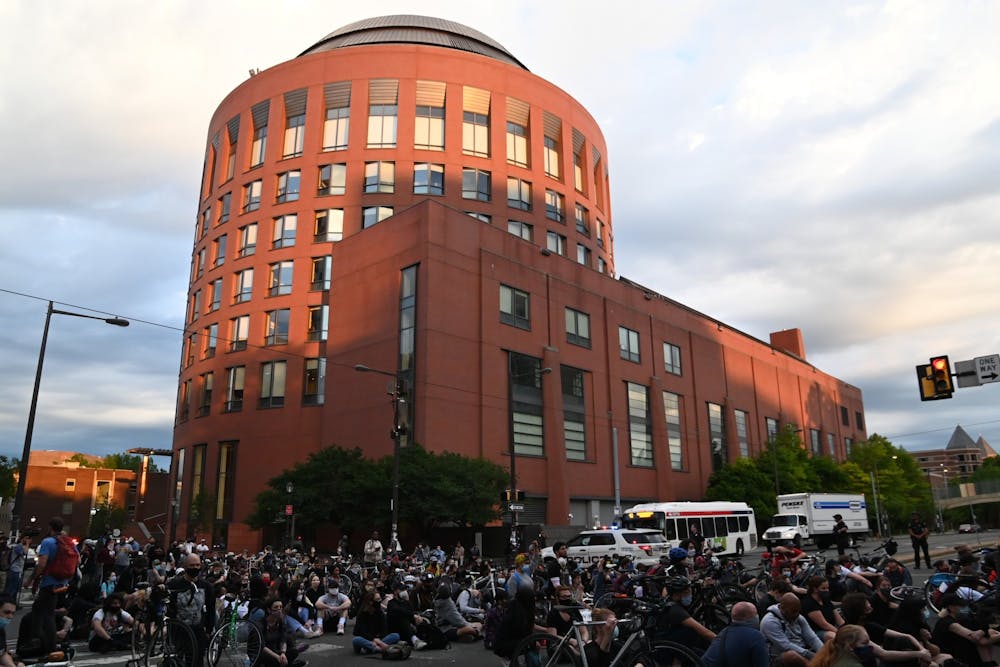
After nine days of nationwide protests across the nation, and five days of protests in Philadelphia, Penn President Amy Gutmann released a follow-up statement to her original May 31 email regarding the killing of George Floyd, a Black male, by a white Minneapolis police officer.
In a community-wide email sent Wednesday afternoon, Gutmann addressed the “ongoing racism, repression, and inflammation of hatred in our society,” and announced the University will be putting forth projects that attempt to “propel progress in our University, city, and society toward a more inclusive and impactful university and community."
Students, however, said Gutmann's second address fell short in communicating the University's financial and civic roles with the larger Philadelphia community.
The Wednesday email comes one day after hundreds of demonstrators conducted a peaceful protest at the intersection of 38th and Walnut Streets near Gutmann’s home on Penn’s campus. It also comes shortly after the circulation of a faculty and student-led petition that demands Penn to cease collaboration with militarized police forces, among other demands largely related to campus safety and inclusion measures.
The proposed projects listed in the email included the establishment of a $2 million fund called the Penn Projects for Progress, aimed to support pilot projects on research that seeks to address various social issues and inequities. These projects will focus on "eradicating or reducing systemic racism, achieving educational equity, and reducing health disparities based on race, class, gender, sexual orientation, and/or social determinants of health."
Gutmann also announced that the 2020-2021 academic year will be named the Year of Civic Engagement, and will include programs, workshops, and other opportunities for students to engage with communities outside Penn's campus — from West Philadelphia to around the world. The email said the Penn Reading Project for the incoming Class of 2024 will include texts from Benjamin Franklin and Martin Luther King, Jr.
The third project outlined in the email encouraged students and faculty to use the University's Campaign for Community fund, initially launched in 2015, to find “ways to discuss and understand the vital social issues that may appear to be the most difficult or intractable.” The fund sponsors campus events that promote community conversation and discussion.
In the email, Gutmann applauded the University's increased proportion of first-generation, low-income students, as well as increase in financial aid offerings and city partnerships that help over 250 public schools and hundreds of social service organizations in the local community.
She acknowledged, however, a gap in what remains to be done to address issues of systemic racism and educational disparities.
While students appreciated that Gutmann named particular initiatives in her second email, sent three days after her first address, many still felt that it did not properly communicate what Penn could do as an institution to resolve those systemic issues and support its communities of color.
"There is always room for stronger messages," rising College senior Ben Wasman said.
Wasman said he hoped the University would address its history in contributing to gentrification in West Philadelphia and funding the Philadelphia Police Department, which was not mentioned in either email from Gutmann.
Rising College senior Kaiyla Banks and rising College junior Kendall Roseboro both said they wished the initial May 31 email had included an acknowledgement of Penn's contribution to inequalities in Philadelphia through historical practices of gentrification as well as the University's failure to pay Payments in Lieu of Taxes.
Gutmann's initial community-wide statement, which aimed to address Floyd's murder, also left students feeling a lack of University support.
Roseboro and Banks said they were disappointed that both emails failed to mention the police and police brutality. Roseboro specifically said Penn failed to acknowledge its contributions to the cycle of oppression by not paying many of its security guards minimum wage, adding that the majority of these workers are Black and brown people.
Banks said the University fails to support its Black students by keeping its cultural center in the basement of the ARCH building, and Roseboro said she appreciated an email sent Wednesday by the 2022 Class Board that also addressed Floyd's death. The email condemned institutionalized racism and its effects on Penn's students of color, and listed educational resources about anti-racism, Penn-affiliated resources, and links to donate to non-profit organizations.
Class Board 2022 President and rising College junior Sam Strickberger said he felt the Class Board had a responsibility not only to send an email, but also to take concrete actions to support Black students. Strickberger also said he hopes the initiatives laid out in Gutmann's second email will serve the Penn community in tangible ways.
"It's important to create new initiatives, and at the same time improve and fix the problems that are [at Penn] currently," said Strickberger.
Wasen and rising College sophomore Wallis Chen both said they thought that Gutmann's most recent email, which was significantly longer than her first address, was a direct response to criticism of her initial statement released earlier in the week.
Chen said although this statement was an improvement over the first one, she found the email to be only a surface-level acknowledgement of the issues of racism. She added that the University has a responsibility to take action against racism as an institution, and not leave the burden to do so on its students.
"Penn is offering these initiatives, but has no recognition that [it is] perpetuating a lot of these injustices," Chen said.
The Daily Pennsylvanian is an independent, student-run newspaper. Please consider making a donation to support the coverage that shapes the University. Your generosity ensures a future of strong journalism at Penn.
Donate







